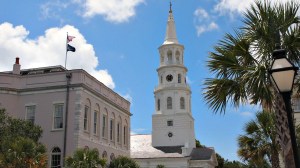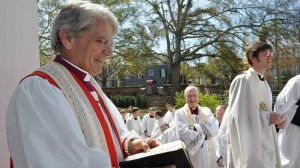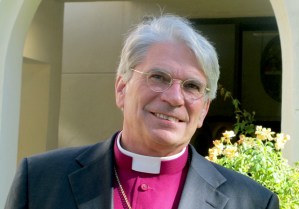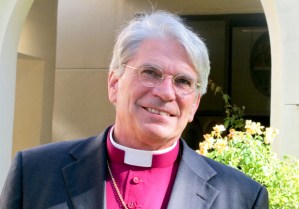In this series

Updated (June 12): The legal dispute between South Carolina's Episcopalians involving church property and identity won't be heard in federal court after all. The Episcopal Church (TEC) sought to take the case to federal court on the basis of First Amendment issues raised. But Federal District Court Judge C. Weston Houck on June 10 ruled against TEC, returning the matter to state court for resolution.
According to The Diocese of South Carolina press office:
Jim Lewis, canon to Bishop Mark Lawrence, said, "The issues involved are essentially those of legal identity and are wholly determined by state law, so the most appropriate place to settle is clearly in state court, where we first took the matter." With the case remanded, it returns to the court of South Carolina Circuit Judge Dianne S. Goodstein. The diocese disassociated from the Episcopal Church after the denomination attempted to remove Bishop Lawrence. Following the Diocese's decision, 49 churches representing 80 percent of the Diocese's 30,000 members have confirmed their disassociation from TEC.
The position of TEC is that Bishop Lawrence no longer has authority to function as head of the diocese, ruling that he had abandoned the church. But Lawrence is seeking a court ruling to recognize his ecclesial authority as head of the Episcopal Diocese of South Carolina.
––-
Updated (Mar. 7): Associated Press reports that a federal lawsuit filed by Episcopal bishop Charles vonRosenberg, the newly elected bishop of the Diocese of South Carolina, is asking the court to "declare he is the only bishop with authority to act in name of the Diocese of South Carolina."
The suit asks for "a preliminary injunction to stop Mark Lawrence from using the name and marks of the Episcopal Diocese of South Carolina and from representing that his activities are associated with the diocese."
__________________
Updated (Jan. 23): A circuit court judge has granted a temporary restraining order "that prevents The Episcopal Church (TEC) … from assuming the identity of the Diocese of South Carolina" until a hearing February 1, according to a press release. Full text at bottom of this post.
The diocese reports that 44 of its 71 parishes and missions support its cause, while 16 support TEC and 11 remain undecided.
––-
Update: George Conger offers a helpful explanation of this interesting development among Anglican church splits, as the Diocese of South Carolina sues The Episcopal Church for, more or less, identity theft. (The diocese formed in 1785, whereas the national denomination formed in 1789; however, the court must assess whether this fact supersedes the denomination's 1979 "Dennis Canon," which says a parish holds its property in trust for the diocese and national denomination.)
Following the Episcopal Diocese of South Carolina's decision to disassociate from The Episcopal Church (TEC) this past October, the diocese–along with 17 local parishes–has now filed a lawsuit against TEC "to protect the Diocese's real and personal property and that of its parishes."
The lawsuit is the latest development in a church dispute that has been ongoing since 2003, when TEC confirmed its first openly gay bishop. The diocese's full split came in October, after TEC attempted to remove Lawrence.
But now that TEC has begun a campaign to establish new leadership for the diocese, South Carolina church leaders are taking their case to court.
According to a letter to parishioners from Lawrence, the lawsuit asks the court "to declare that The Episcopal Church (TEC) has no right to the Diocese's identity and property or that of its parishes …including church buildings and rectories, which our forefathers built and even shed blood over, and you have maintained without any investment of any kind from the national church."
Lawrence also recently responded to the news that TEC presiding bishop Katharine Jefferts Schori will visit Charleston later this month for a convention of those wishing to re-associate with TEC.
"They are certainly free to gather and meet, but they are not free to assume our identity," Lawrence stated. "The Diocese of South Carolina has disassociated from the Episcopal Church, we've not ceased to exist. We did not become a new entity upon our disassociation."
He continued: "A new entity will need to be created by those who choose to leave the Diocese and re-associate with the Episcopal Church."
However, a statement from TEC maintains that "dioceses cannot leave the Episcopal Church. While some clergy and individuals may choose to leave, congregations and property remain in the diocese to be used for the mission of the Episcopal Church."
CT has long covered the "land and building wars" being fought within mainline denominations (hint: the denom usually wins), and has noted the many hurdles facing the fractured Episcopal church.
––––––-
Full press release from the diocese:
***BREAKING NEWS***
5:52 pm
For Immediate Release
CIRCUIT COURT BLOCKS THE USE OF THE DIOCESE OF SOUTH CAROLINA
IDENTITY BY ANYONE OUTSIDE THE DIOCESE
Temporary restraining order bans use of Diocese's name, trademarks, symbols
St. George, SC, January 23, 2013 – South Carolina Circuit Court Judge Diane S. Goodstein today issued a temporary restraining order that prevents The Episcopal Church (TEC) and parishes and individuals associated with it from assuming the identity of the Diocese of South Carolina.
The judge's order states, in part: "No individual, organization, association or entity, whether incorporated or not, may use, assume, or adopt in any way, directly or indirectly, the registered names and the seal or mark of The Protestant Episcopal Church in the Diocese of South Carolina."
The order specifically prohibits all but a handful of Diocesan employees, directors and trustees who are specified by name from using the Diocese's identity.
The judge effectively prevents TEC, a voluntary association, and the parishes who support it, from claiming to own or operate the Diocese of South Carolina, an entity that it insists it owns but whose very existence predates The Episcopal Church. The Diocese of South Carolina was established in 1785 and was a founder of TEC nearly five years later. The Diocese is a legally established South Carolina corporation and its trademarks are protected under state law.
TEC and several local parishes that remain associated with it have begun to assume the Diocese's identity and use its seals, name and trademarks on websites, ads in newspapers, and other documents sent to parish corporations and individuals, and in registration forms mailed to the parishes within the Diocese stating its intent to take actions at its upcoming meeting on January 26.
The order states "The use of the names and marks of the Diocese of South Carolina can affect its goodwill, its third party relationships and create confusion among those with whom it deals in the ordinary course of its business. In short, the ongoing business of the Diocese of South Carolina could be irreparably injured if corporate changes occur in its name, implemented by those without actual corporate authority."
Judge Goodstein's order, which takes effect immediately, prohibits such misappropriation of the Diocese's identity for 10 days. A hearing has been scheduled for February 1 to determine whether the temporary restraining order should be replaced by an injunction that could extend the prohibition until the court rules on a lawsuit filed recently by the Diocese of South Carolina, its trustees and 31 congregations, seeking to protect the Diocese's real, personal and intellectual property and that of its parishes from a TEC takeover.
The judge's decision comes days before TEC has scheduled to convene a "special convention" meeting, purportedly to choose new leadership for the Diocese of South Carolina. The stated goal of the meeting is to elect a provisional bishop and clergy and lay people to serve in diocesan positions to fill vacant offices of an organization whose ownership is contested.
TEC has historically filed lawsuits against parishes and dioceses that have disassociated over theological differences with the church, and has evicted congregations from their churches. In all, TEC has filed more than 80 lawsuits, spending more than $22 million in legal fees.
Locally, 44 of the Diocese's 71 parishes and missions have voted to support the Diocese; 16 support TEC and 11 still remain undecided. The parishes and missions supporting the Diocese represent about 77 percent of the Diocese's 30,000 members.
About the Diocese of South Carolina
The Diocese was founded in 1785 by the parishes of the South Carolina colony, who worshipped according to the practices of the Church of England prior to the American Revolution. Based in the Lowcountry of South Carolina, the Diocese is one of the oldest religious districts in the United States and counts among its members several of the oldest, operating churches in the nation.
For more information contact:
Jan Pringle, (678) 667-6169
Or
Joy Hunter, (843) 696-1757
jhunter@dioceseofsc.org
MEDIA NOTE: For additional backgrounders, photos, and other information, visit http://www.diosc.com/media.htm
For interviews, contact Jan Pringle 843-838-9777 or 678-669-6167; or Joy Hunter 843-696-1757













